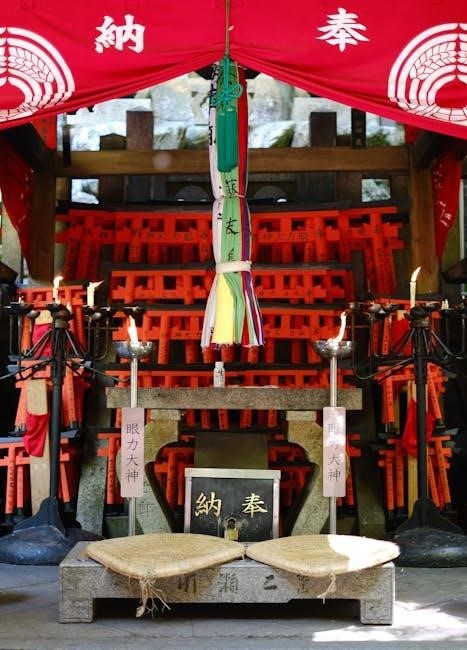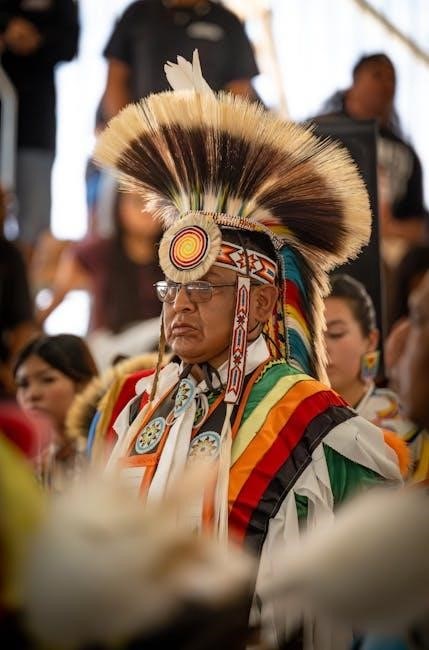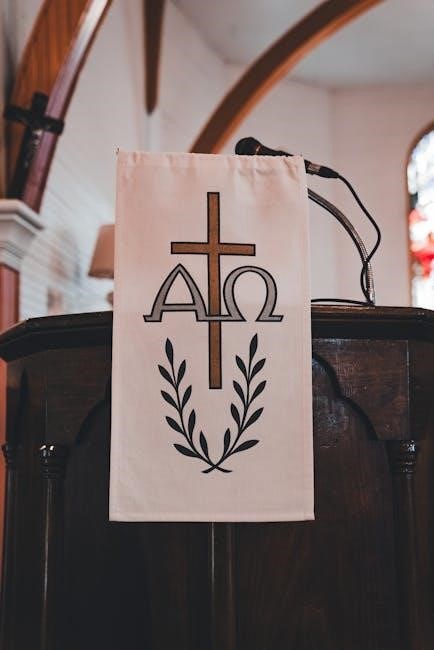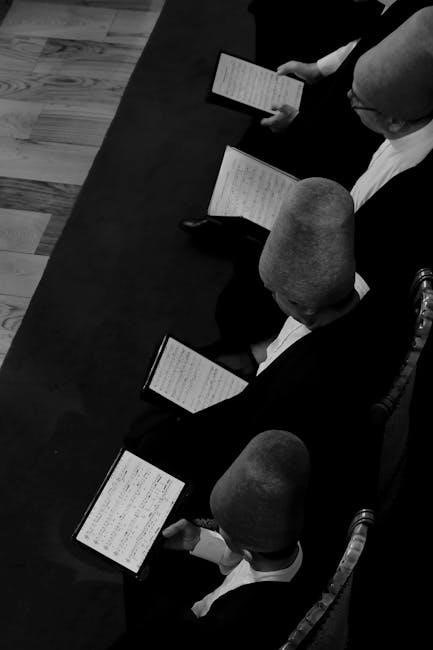The Kappa Alpha Psi ritual is a cornerstone of fraternity life, embodying its values and traditions․ It fosters brotherhood, knowledge, and fidelity, guiding members toward achievement and service․
Overview of Kappa Alpha Psi Fraternity
Kappa Alpha Psi Fraternity, Inc․, founded on January 5, 1911, at Indiana University Bloomington, is a historically Black Greek-letter organization․ Its mission revolves around achievement through fraternity, knowledge, and fidelity, emphasizing academic excellence, community service, and brotherhood․ The fraternity has grown into a global network, with chapters across the U․S․ and abroad․ It is known for its strong emphasis on personal development, leadership, and cultural enrichment․ Members are united by a shared commitment to uplifting their communities and fostering a spirit of unity and progress․ The fraternity’s legacy is rooted in its ability to adapt while maintaining its core values, making it a cornerstone of African American college life and beyond․

Significance of the Ritual in Fraternity Life
The ritual of Kappa Alpha Psi is a vital component of fraternity life, serving as a bonding experience that reinforces core values and traditions․ It fosters a deep sense of brotherhood, unity, and shared purpose among members․ The ritual emphasizes the principles of achievement, knowledge, and fidelity, guiding members to strive for excellence and service․ By participating in these ceremonies, members connect with the fraternity’s history and legacy, creating a strong sense of identity and responsibility․ The ritual also plays a crucial role in new member education, ensuring the continuity of the fraternity’s mission and values․ It is through these sacred traditions that Kappa Alpha Psi cultivates leaders committed to uplifting their communities and fostering positive change․
Historical Background
Kappa Alpha Psi was founded on January 5, 1911, at Indiana University Bloomington, emerging amid racial challenges․ Its creation aimed to foster unity, academic excellence, and brotherhood․
Founding of Kappa Alpha Psi Fraternity
Kappa Alpha Psi Fraternity, Inc․, was founded on January 5, 1911, at Indiana University Bloomington by Elder Watson Diggs and nine other visionary men․ Established during a time of racial segregation, the fraternity aimed to foster unity, academic excellence, and brotherhood among African American male students․ Diggs, often referred to as the “founder,” emphasized the importance of education and collective progress․ The fraternity’s creation marked a significant step in promoting intellectual and social growth within the African American community․ Its founding principles laid the groundwork for a legacy of achievement, service, and cultural enrichment, making it a pivotal organization in the history of Black Greek-letter fraternities․
Evolution of the Ritual Over Time
The Kappa Alpha Psi ritual has evolved significantly since its inception in 1911, reflecting the fraternity’s growth and adaptation to societal changes․ Initially designed by Founder Elder Watson Diggs, the ritual was rooted in the principles of achievement, knowledge, and fidelity․ Over the decades, it has been refined to incorporate historical references, cultural nuances, and contemporary values while maintaining its core purpose․ The fraternity’s expansion across the U․S․ and internationally influenced its rituals, ensuring they remain relevant to diverse membership․ Despite these changes, the ritual’s essence—fostering brotherhood and guiding members toward greatness—has endured, solidifying its role as a cornerstone of fraternity life․

Core Values and Principles
The core values of Kappa Alpha Psi—achievement, knowledge, and fidelity—guide members in personal and collective growth, emphasizing brotherhood, service, unity, and commitment since 1911․
Achievement Through Fraternity, Knowledge, and Fidelity
The core principles of Kappa Alpha Psi are rooted in achievement, knowledge, and fidelity․ These values, known as the Great Purpose, guide members to strive for excellence in all endeavors․ Achievement is cultivated through academic success and personal growth, while knowledge is pursued to empower individuals and communities․ Fidelity emphasizes loyalty, integrity, and commitment to the fraternity’s mission․ These principles are deeply embedded in the ritual, reinforcing the importance of brotherhood, service, and intellectual development․ By upholding these values, members embody the fraternity’s legacy and contribute to its enduring impact on society․

The Great Purpose of Kappa Alpha Psi
The Great Purpose of Kappa Alpha Psi is to foster achievement through fraternity, knowledge, and fidelity․ This purpose encapsulates the fraternity’s commitment to empowering its members and the community․ By emphasizing fraternity, the organization strengthens bonds of brotherhood, creating a supportive network for personal and collective growth․ Knowledge is pursued to enlighten and equip members with the tools needed to address societal challenges․ Fidelity ensures loyalty to the fraternity’s principles and a dedication to its mission․ The Great Purpose is central to the ritual, inspiring members to strive for excellence and serve humanity with integrity and purpose․

Ritual Structure and Protocol
The Kappa Alpha Psi ritual follows structured ceremonies, emphasizing officer roles and specific protocols․ Key elements include the Polemarch’s leadership, recitation of verses, and acts of service, ensuring unity and tradition․

Key Components of the Ritual Ceremony
The Kappa Alpha Psi ritual ceremony includes solemn oaths, symbolic acts, and the recitation of foundational principles․ Central elements involve the Polemarch’s leadership, the reading of sacred texts, and the performance of acts of kindness․ Members are reminded of the fraternity’s history and values, such as achievement, knowledge, and fidelity․ The ceremony also incorporates the use of regalia and specific protocols to ensure tradition and unity․ These components are designed to foster brotherhood, reflect the fraternity’s legacy, and inspire members to uphold its mission․ The ritual serves as a cornerstone for initiating new members and reinforcing the organization’s enduring principles․
Role of the Polemarch and Other Officers
The Polemarch serves as the chief officer, leading the ritual ceremony with authority and precision․ They ensure adherence to tradition and protocol, guiding members through sacred oaths and symbolic acts․ The Vice-Polemarch supports the Polemarch, often reciting specific verses or facilitating key moments․ Other officers, such as the Stratagus and Oracle, have designated roles, including explaining rituals and maintaining order․ Together, these leaders embody the fraternity’s values, fostering an environment of respect and unity․ Their roles are essential to the ceremony’s integrity, ensuring the legacy of Kappa Alpha Psi is preserved and passed to future generations through structured and meaningful participation․
Community Service and Membership Education
Kappa Alpha Psi emphasizes acts of kindness and unselfish service, fostering a culture of giving back to the community․ Membership education enriches personal growth and prepares members for lifelong contributions․
Acts of Kindness and Unselfish Service
Central to Kappa Alpha Psi’s mission is the commitment to acts of kindness and unselfish service․ During pledgeship, prospective members must perform acts of kindness, benefiting individuals, schools, or communities․ These acts, reported to the Pledgemaster, reflect the fraternity’s dedication to fostering a spirit of giving and compassion․ Such initiatives strengthen bonds within the community and uphold the fraternity’s values of service and brotherhood․ By prioritizing unselfish service, Kappa Alpha Psi cultivates leaders who are not only committed to personal growth but also to the betterment of society․ This tradition ensures that the fraternity’s legacy endures through meaningful contributions to humanity․
New Member Education and Traditions

New member education in Kappa Alpha Psi is designed to instill the fraternity’s principles, history, and traditions․ Prospective members engage in structured learning sessions, where they gain insight into the fraternity’s founding, values, and expectations․ These sessions are led by experienced members who emphasize the importance of brotherhood, achievement, and service․ Traditionally, new members participate in rituals and activities that reinforce the fraternity’s legacy and purpose․ The education process culminates in a formal initiation ceremony, marking their official membership․ Through this journey, new members develop a deep understanding of Kappa Alpha Psi’s heritage and are prepared to contribute meaningfully to the fraternity’s mission․
The Kappa Alpha Psi ritual leaves a lasting legacy, inspiring brotherhood, achievement, and service․ Its traditions and values continue to empower members, shaping their futures and communities․
Legacy and Impact of Kappa Alpha Psi Rituals

The rituals of Kappa Alpha Psi have left an indelible mark on its members and communities․ By fostering brotherhood, knowledge, and fidelity, these traditions inspire personal growth and collective progress․ The fraternity’s emphasis on achievement and service has empowered generations to contribute meaningfully to society․ Historical references within the rituals remind members of their heritage, reinforcing a sense of unity and purpose․ Through acts of kindness and unselfish service, the fraternity’s legacy extends beyond its members, positively impacting countless lives․ The enduring principles of Kappa Alpha Psi ensure its rituals remain a vital part of its identity, guiding future leaders and strengthening communities․
